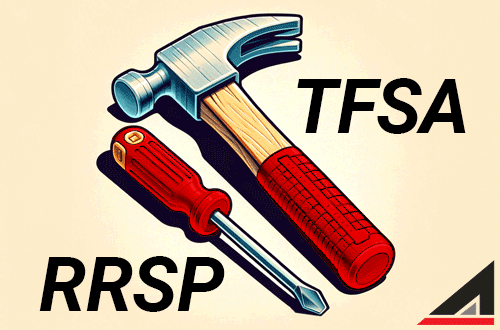This is the time of year when people consider both RRSPs and TFSAs. It can be a complicated and confusing topic. Let’s dive into each plan, discuss the benefits, and discuss when you might want to choose one over the other for your savings strategy!

Registered Retirement Savings Plan (RRSP)
RRSPs are an investment strategy that can hold savings and investments. The notable perk is that the funds added to your RRSP in the year are used as reduction to your taxable income and therefore saves you taxes. This is a significant benefit to taxpayers.
The tax savings with RRSP payments is a “deferral” of paying taxes. An important thing to keep in mind is that you will pay taxes when you draw funds out of your RRSP account. The tax obligation will be on your initial deposits into the account plus the market increases and income paid on the investments over the life of the plan.
To sum up RRSPs, they are tax deductible at your current tax rates when you contribute. Withdrawals from the account are taxed at your applicable tax rate at the time of withdrawal. In an ideal scenario, you would make more money today and invest in RRSPs to see an immediate tax benefit. Then after you retire, you have less income and draw funds out of your RRSP, thus you would pay tax on those funds when you are in a lower tax bracket, forming tax savings over the life of your RRSPs.
It is important to note that when you turn 71, you can no longer contribute to your RRSPs and any funds in the plan will be converted to registered retirement income funds (RRIFs) which are a monthly payment issued to you, to use up the funds in your lifetime. This monthly payment is also taxable income.
What if you have other sources of income after you retire? What if you have a pension, or rental properties? If you are going to be in a higher tax bracket upon retirement, then the desire for RRSPs may be less. If you have RRSP income on top of your CPP, OAS, Pensions, Rent, and other post-retirement income, then you may be at risk of being in high tax brackets or even losing your OAS eligibility. In situations like this, a TFSA might be a more suitable plan for you.
Tax-Free Savings Account (TFSA)
TFSAs are also investment strategies that can hold savings and investments. Like RRSPs, they are invested, and the value should grow over the life of the investment and form a pool of funds to support you during retirement.
A significant difference to RRSP is that you pay into TFSA using after-tax dollars. This means you do not get a reduction or savings in your income taxes in the year you contribute to the TFSA. This is not all bad news though, because when you draw funds out of the plan later, there are no taxes paid at that time either. Your initial deposits and the investment growth and income would all be tax free.
To sum up TFSAs, you will not get a tax deduction at the time of contribution, and you also do not pay any taxes when you make withdrawals out of the account. You also do not pay any taxes on the income, gains or dividends earned on the account in its lifetime. There is no age limit on TFSA for contributions nor withdrawals. This makes TFSAs much more flexible to work with.
If you expect to be in a higher tax bracket later in life, and have multiple sources of income after age 71, you may want to consider paying into a TFSA. If your tax rates at retirement will be higher than the tax bracket you are in today, then RRSPs may cause more tax planning issues than they will help.
RRSP vs TFSA: Are they Similar?
The short answer, YES! There are many similarities.
- Annual limits. While calculated differently, they both have an annual limit for what you can contribute.
- Savings strategy. They are both registered savings accounts that any Canadian resident over the age of 18 can use to hold a variety of investments.
RRSP vs TFSA: Which is Right for You?
The choice between RRSP and TFSA depends on several factors:
- Do you prefer (or need) the tax deduction now? Remember, RRSPs save tax dollars now, and TFSAs do not.
- How much income will you have when you retire? RRSPs form taxable income when withdrawn, which can create income planning issues. TFSAs are not taxable income upon withdrawal from the plan.
- What is your timeline for using the money? RRSPs are typically used after retirement when income is much lower. TFSAs are viewed more as “emergency funds” or retirement funds. Since they are not taxed on withdrawal and the growth is also tax free, they are much more flexible.
As you can see, there is no perfect answer when choosing your savings strategy. Your income, timeline, investment strategy and other factors will impact your choice to use RRSPs or TFSA. Sometimes you may want to use both savings strategies to achieve an optimal retirement plan. The factors discussed here are a simplification of the two different savings plans and you can speak with your us and investment advisor for a more detailed savings strategy that fits your personal situation.
